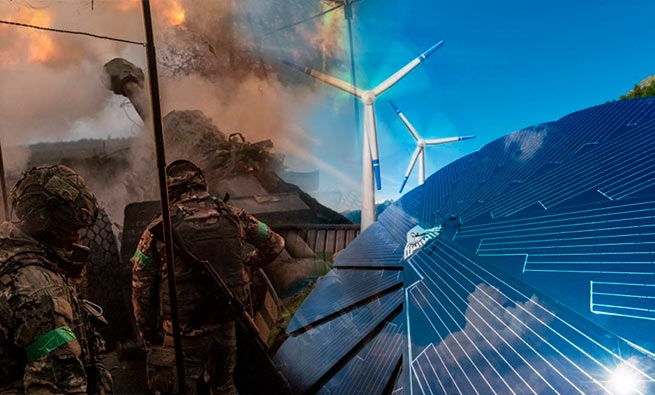Business and political leaders in Europe and the US are confident that war in Ukraine will delay the achievement of zero carbon targets by at least three years, as many countries of the so-called. “collective West” are turning to alternative sources of fossil fuels, trying to implement sanctions aimed at energy supplies from Russia.
At the same time, according to the results of an international study by BayWa re, the overall impact of the climate and energy crisis is accelerating the transition to renewable energy sources: 96% of business leaders have already implemented renewable energy sources or plan to do so in the future. On the other hand, 53% of business leaders say that rising energy prices have brought new urgency, positively impacting their sustainability goals.
Report
In 2022, coal is back in the global conversation on the internet, with more than a million mentions per month, almost 12% more than in 2021, according to BayWare. Coal-related mentions increased by 130% between 2020 and 2022. All of this is happening in the context of changing online conversations, where consumers have increased the relevance of such references as “climate crisis” and “climate action” that have overtaken “global warming” as a topic of conversation.
This data comes from BayWa re’s “The Decade That Matters 2.0” study, which surveyed 3,000 business leaders and policy makers in Europe, the UK and the US and used a social media data analytics platform to draw conclusions about the evolution of online public discourse. .
The direction of movement is clear: enterprises are switching to renewable energy sources. However, in terms of fully achieving this transition, 57% of business leaders believe it will happen. no earlier than 2050 or later, and nearly one in ten (8%) believe the transition will never be fully achieved. This contrasts with the opinion of politicianssurveyed in the BayWa re study, where more than a third (35%) believe that the transition will take place in the 2030s, and only 11% suggest that it will take place after 2050.
What about in Greece
In Greece, politicians are currently showing an extremely high level of commitment to the so-called. green energy, as evidenced by the goals of the new National Energy and Climate Plan (NECP) recently presented by the government, where the target for the contribution of RES to gross final energy consumption for 2030 was increased to 45%, which is 10% higher than in previous NECP and 5% higher than the target agreed at the European level.
At the same time, Greek businesses are much more skeptical and less interested in prioritizing the issue of energy transition, according to data from the European Investment Bank: only 25% of Greek businesses have invested in energy efficiency measures in 2022, and only 24% of Greek businesses plan to invest in this area in the next three years.
“Two years have passed since the first Decade That Matters study, and the content of the study is as relevant as ever. The effects of the climate crisis are now being felt around the world, and this crisis is not dependent on recession, politics, borders, or the very speed of human adaptation” ,” said Matthias Taft, CEO of BayWa re.
The survey shows that although politicians recognize this need, businessmen are not ready to pay for it out of their own pocket. “The war in Ukraine has been both a catalyst for accelerating the transition to renewable energy and at the same time increasing dependence on fossil fuels in the short term. While the direction is clear, speed is essential and any delay risks exacerbating the climate crisis. Although the transition has now accelerated, the speed not yet high enough.
Responsibility shifting dominates the European landscape
Politicians and business leaders disagree not only on the timing of the switch to renewable energy, but also on the main obstacles to achieving zero emissions. Globally, business leaders note that lack of government support (34%) and public policies (29%) are delaying the path to zero emissions. However, policymakers believe that the biggest challenges are public awareness (35%) and the speed with which businesses can adapt (35%). However, 42% of business leaders and 33% of politicians agree that cost is a very important barrier.
Philippe Kunze, CEO of BayWa re Greece, said: “The results of the study show that there is a need for closer and more effective cooperation between the state and politicians, as well as key representatives of the economy and business. There is currently growing concern in Greece about delays in processing requests for the conditions for granting links and this is where a clear and transparent prioritization of these requests needs to be strategically established We are at a tipping point when it comes to addressing climate change and we need to do more in Greece and across Europe to remove barriers BayWa re hopes that this study will serve as a reminder of the need for progress both in Greece and around the world.”
Transforming Public Opinion Leads to Action
The Decade That Matters 2.0 study also shows a growing shift in public opinion trends regarding climate change as expressed online and reflected in social media data analysis. The original study showed that between 2015 and 2019, the number of references to “zero emissions” increased by more than five times. The next three years saw the same significant growth over a much shorter period of time.
2021 also saw a notable shift in regards to the term “climate crisis”, surpassing “global warming” as the topic of discussion with the highest number of mentions online, over 2.5 million. In 2022, the trend reversed again, with overtly negative references to “zero emissions” doubling compared to 2018.
These changes in awareness (rather imposing a point of view. Note. editions) of the public are undoubtedly influenced by dramatic events related to global issues that testify about moving from mere awareness to a sense of urgency. While they continue to evolve, they also show a growing impatience with the current pace of change. The opportunity to take the necessary steps to avert the most devastating impacts of the climate crisis still exists, but that window of opportunity is rapidly closing as the first effects of the climate crisis are already being felt around the world, the authors of the study say.







More Stories
The weather will turn bad on Good Friday
Crete "shaking" – two earthquakes this morning
Ecological… tombstones